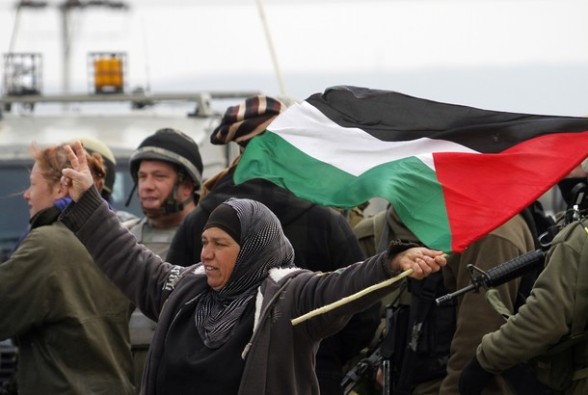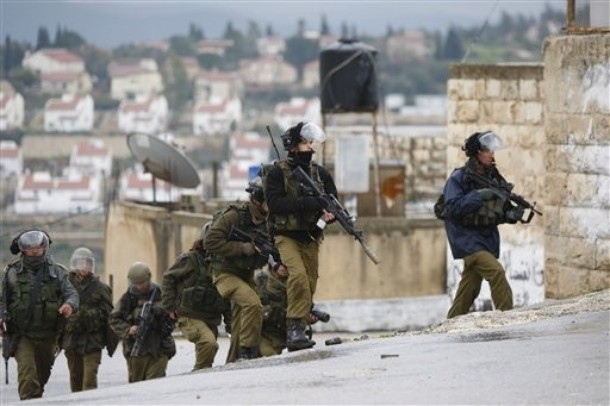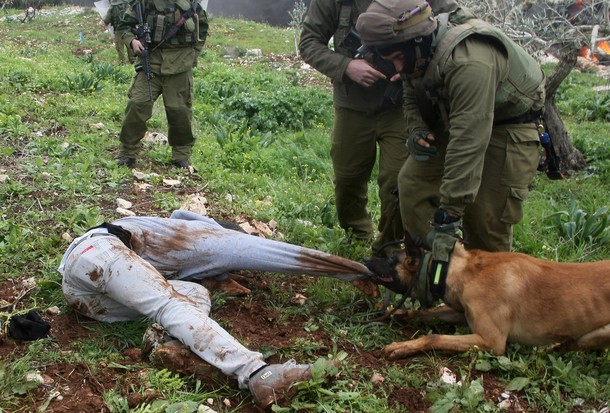Amnesty: stop arms trade with Israel – 45 protesters killed in last 3 years
All photos except the first come from a series posted by Occupied Palestine in 2012. Mondoweiss summarises the Amnesty report, Eleonora Gatto in MEMO writes about the remarkable role of women in creating non-violent resistance. Notes and links on Nabi Saleh.
Bilal Tamimi being attacked by an Israeli soldier during demonstration in Nabi Saleh, May 2013. See news report of Tamimi’s latest arrest after Amnesty report. Photo by Tamimi Press, used in Amnesty Int’l report
Phil Weiss with Annie Robbins, Mondoweiss
February 27, 2014
Amnesty International has released a stunning report saying that the international community should cut off military aid to Israel because Israel has killed dozens of civilians at peaceful protests in the last three years “widespread impunity”– including 22 civilians last year. The human rights organization concludes
It urges the USA, the European Union and the rest of the international community to suspend all transfers of munitions, weapons and other equipment to Israel.“Without pressure from the international community the situation is unlikely to change any time soon,” said Philip Luther [Middle East and North Africa Director at Amnesty International].“Too much civilian blood has been spilled. This long-standing pattern of abuse must be broken. If the Israeli authorities wish to prove to the world they are committed to democratic principles and international human rights standards, unlawful killings and unnecessary use of force must stop now.”
The 87-page report is titled, Trigger-happy: Israel’s use of excessive force in the West Bank. The Institute for Middle East Understanding emphasizes that the report comes out just as AIPAC, the American Israel Public Affairs Committee, is having its Washington conference at which it will celebrate US aid to Israel:
Its publication coincides with the annual American Israel Public Affairs Committee (AIPAC) policy conference, which runs from March 2 to 4 in Washington, DC, and Israeli Prime Minister Benjamin Netanyahu’s meeting with President Obama, which is scheduled to take place while Netanyahu is in Washington for the conference.The report documents “mounting bloodshed” in the occupied territories as a result of the Israeli army’s use of “unnecessary, arbitrary and brutal force against Palestinians” over the past three years. In the press release accompanying the report, which is included below, [press release] the director Amnesty’s Middle East and North Africa Programme, Philip Luther, notes: “The frequency and persistence of arbitrary and abusive force against peaceful protesters in the West Bank by Israeli soldiers and police officers – and the impunity enjoyed by perpetrators – suggests that it is carried out as a matter of policy.”
Amnesty’s summary emphasizes that the victims were protesting occupation:
Armed Israeli police hurry towards unarmed Palestinians protesting at the expansion of the Jewish settlement Halamish near Ramallah, Friday, March 16, 2012. Photo by Majdi Mohammed / AP
Israeli forces have repeatedly violated their obligations under international human rights law by using excessive force to stifle dissent and freedom of expression, resulting in a pattern of unlawful killings and injuries to civilians. They do so with virtual impunity due to the authorities’ failure to conduct thorough investigations. This report focuses on the use of excessive force in the West Bank since the beginning of 2011. It includes cases of killings and injuries of Palestinian civilians in the context of protests against Israel’s continuing military occupation of the Palestinian territories, illegal Israeli settlements and the fence/wall.
Here’s more from Amnesty’s coverage of its report,
Israeli forces have displayed a callous disregard for human life by killing dozens of Palestinian civilians, including children, in the occupied West Bank over the past three years with near total impunity, said Amnesty International in a report published today.The report describes mounting bloodshed and human rights abuses in the Occupied Palestinian Territories (OPT) as a result of the Israeli forces’ use of unnecessary, arbitrary and brutal force against Palestinians since January 2011.In all cases examined by Amnesty International, Palestinians killed by Israeli soldiers did not appear to be posing a direct and immediate threat to life. In some, there is evidence that they were victims of wilful killings, which would amount to war crimes.“The report presents a body of evidence that shows a harrowing pattern of unlawful killings and unwarranted injuries of Palestinian civilians by Israeli forces in the West Bank,” said Philip Luther, Middle East and North Africa Director at Amnesty International.“The frequency and persistence of arbitrary and abusive force against peaceful protesters in the West Bank by Israeli soldiers and police officers – and the impunity enjoyed by perpetrators – suggests that it is carried out as a matter of policy.”Deaths and injuriesAmnesty International has documented the killings of 22 Palestinian civilians in the West Bank last year, at least 14 of which were in the context of protests. Most were young adults under the age of 25. At least four were children.According to UN figures, more West Bank Palestinians were killed by Israeli forces in 2013 than the total number killed in 2011 and 2012 combined. Forty-five were killed in the past three years.Peaceful protesters, civilian bystanders, human rights activists and journalists are among those who have been killed or injured.In the last three years at least 261 Palestinians, including 67 children, have been seriously injured by live ammunition fired by Israeli forces in the West Bank.An astonishing number of Palestinians in the West Bank – more than 8,000, including 1,500 children – have been wounded by other means, including rubber-coated metal bullets and the reckless use of tear gas, since January 2011.
An Israeli army dog attacks a Palestinian protester during a demonstration against the expropriation of Palestinian land by Israel in the village of Kafr Qaddum, near Nablus, on March 16, 2012. Photo by Jaafar Ashtiyeh/AFP/Getty Images
Algemeiner has attacked the report, saying Amnesty’s bias is proved by video of one incident that shows Palestinian demonstrators throwing large stones at occupying Israeli soldiers.
“According to Amnesty, the IDF must wait until a soldier is killed before using lethal force…. The anti-Israel bias is blatant.”
But as Annie Robbins points out, the stone-throwing Algemeiner publicizes followed the killing of three Palestinians by Israeli soldiers (see Allison Deger’s reports at the links).
Women of Nabi Saleh leading the protest after the killing of Rachel Corrie. Photo from Rachel Corrie Foundation.
By Eleonora Gatto, blog, MEMO
February 07, 2014
On January 31 2014, the Popular Struggle Committees participants united as part of the “Melh Al-Ard” (salt of the Earth) campaign with the objective of revitalising the abandoned village of Ein Hiljeh in the Jordan Valley.
The choice of the location wasn’t random; it’s strongly connected to the political requests of the action: stop the on-going effects of the Occupation’s plan and reconfirm the Palestinian sovereignty over those territories in the Jordan Valley (Area C) that Israel want to annex with the assent of the negotiations carried out by US Secretary of State John Kerry.
More than 300 Palestinians from different villages of the West Bank gathered on the first day. An increased participation compared to that of 2013 in Bab Al-Shams, the Palestinian encampment erected on the outskirts of Jerusalem, where Israel wanted to build 35,000 housing units creating a corridor of settlements with the intent of fragmentising and isolating the Occupied Palestinian Territories.
The transformation and appropriation of Palestinian land, implemented by Israel, doesn’t only aim to the establishment of the Zionist idea of “Greater Israel”, it also has a less visible agenda: the control of the Palestinian population and resources.
The Palestinians counteract by refusing the occupant’s authority, reclaiming the Palestinian sovereignty, denouncing the occupation in all its elements and looking for new forms of nonviolent popular struggle.

Palestinian woman in front of Israeli soldiers during a protest against Israel’s controversial separation barrier in the village of Maasarah near the West Bank city of Bethlehem after the weekly Friday prayers on March 16, 2012. Photo by Musa Al Shaer/AFP/Getty Images)
The aim is to create an alternative grassroots movement able to escape from corrupt government policies but with a national impact. Direct nonviolent actions as Ein Hijleh have a powerful resonance: they raise consciousness and use creative tension as a mean of bringing down an unjust system, replaced by a just and human one.
“Melh Al-Ard” (Salt of the Earth) refers to a phrase from the bible, Matthew 13:5: “You are the salt of the earth. But if the salt loses its saltiness, how can it be made salty again? It is no longer good for anything, except to be thrown out and trampled underfoot.”
As the communication of the campaign states: “The sons and daughters of Ein Hijleh call upon our people to join the struggle to revive the village and protect our rights, history, culture and land. Daughters and sons of Palestine be the salt of this earth and stay steadfast on it.”
To this invitation, residents of Nabi Saleh responded by leaving their village, still involved in the weekly Friday demonstrations against the Israeli Occupation Forces, to head towards Ein Hijleh. Nabi Saleh is a small village of 500 inhabitants located near Ramallah and belonging to the Tamimi family.
An essential member of the Popular Struggle Committee, it’s one of the most active resistant villages in the West Bank. Positioned in area C, their struggle is against the illegal expansion of the Halamish settlement. In 2008 Ein Al-Qaws was taken over by the settlers, since then Nabi Saleh has been fighting against the Occupation system.
On Friday, Nabi Saleh’s inhabitants challenged the mobile checkpoints that were blocking the main roads to Ein Hijleh. After taking a secondary road and deceiving the Israeli police, they arrived triumphantly singing their way through the palms that surround the ruins of the old Canaanite village.
In the village of Nabi Saleh, the role of women is fundamental to the popular struggle. The commitment of women is recognised and supported because “they are the educators of the new generations. If women aren’t free nor will the new generations be”, Bassem Tamimi, recognised as Human Rights Defender by the EU, said.
Women are the driving force of the nonviolent movement in Nabi Saleh. Every Friday, while chanting slogans and proudly holding Palestinian flags, they daringly lead the march towards the tower at the entrance of the village or towards Ein Al-Qaws.
Nabi Saleh children try to prevent Wa’ed Tamimi, inside the vehicle, from being taken away. The blonde girl with the ponytail is his sister. Photo by ActiveStills
“Palestinian women are planting the seeds of resistance,” Manal Tamimi says. She explained that the women raise their children in a culture of resistance and they are teaching them not to be victims themselves but to react.
For this reason, despite the uncertainty and danger, the women of Nabi Saleh brought their children to Ein Hijleh. “We want them to learn the spirit of volunteering. It’s important for children to participate to these actions in order to grow aware of their role in the resistance,” Manal said.
Women and children of Nabi Saleh are well aware of how to act in case of raids from the army, they were born and raised under occupation and they’ve had to deal with it daily.
“Let them come. The army comes everyday to my house stepping on my land,” Rouan Tamimi said. Women also join these events to help deter the use of excessive violence towards the activists.
It is pivotal to involve children and women in the construction of the foundations of society in order to assure an inclusive community. The strength of the nonviolent movement is the equality of responsibility, regardless of affiliation, gender or social class. Anyone can give their contribution to the struggle.
The author is a Servizio Civile Internazionale Italia (SCI) volunteer with a Master’s degree in International Cooperation. She is currently living in Nabi Saleh and reporting about the Popular Struggle.
Notes and linksA tiny village with a big voice, pdf file, Amnesty report, Nov/Dec 2013.Nabi Saleh, 11.2.14, Bilal Tamimi’s latest video (no subtitles).Trigger Happy: Israel’s use of excessive force in the West Bank,pdf file, Oxfam, February 2014Welcome to the Nabi Saleh Solidarity blog. This blog/website has been established as an english language site for solidarity with the Palestinian village of An Nabi Saleh.An Nabi Saleh is a small village of approximately 550 people, twenty kilometres north west of Ramallah in the West Bank of the Occupied Palestinian Territories.The Israeli colony of Halamish (also known as Neveh Tzuf ) was established on lands belonging to the villages of An Nabi Saleh and Deir Nidham in 1976. In response to the illegal colony being established on their land, the residents of An Nabi Saleh and Deir Nidham began holding demonstrations in opposition to the stealing of their land and the establishment of the colony (whose establishment violates international law). The residents of An Nabi Saleh and Deir Nidham lodged a court case against the colony in Israel’s high court, but were unable to stop the construction the illegal settlement.Since its establishment in 1977, Halamish colony has continued to expand and steal more Palestinian land. In 2008, the residents of An Nabi Saleh challenged the building of a fence by the colony on private Palestinian land and which prevented Palestinians from accessing their land. The Israeli courts ruled that the fence was to be dismantled Despite the Israeli court ruling, the colony continued to illegally annex more Palestinian land. In the summer of 2008, the Israeli colonists from Halamish seized control of a number springs, all of which were located on private Palestinian land belonging to residents of An Nabi Saleh.In December 2009, the village began weekly non-violent demonstrations in opposition to the illegal Israeli colony of Halamish annexing of the fresh water springs and stealing of more of the village’s land. Since An Nabi Saleh began its demonstrations, the Israeli military has brutally sought to repress the non-violent protests, arresting more than 13% of the village, including children. In total, as of 31 March 2011, 64 village residents have been arrested. All but three were tried for participating in the non-violent demonstrations. Of those imprisoned, 29 have been minors under the age of 18 years and 4 have been women.Recently two prominent leaders of the village’s non-violent struggle, Naji Tamimi and Bassem Tamimi, were arrested for their role in the non-violent struggle. Today, they remain political prisoners in Israel’s jails, charged with “incitement” and organising “illegal” demonstrations.Since the demonstrations began in December 2009, International peace activists and Israeli activists opposed to their government’s occupation and apartheid policies have joined in solidarity An Nabi Saleh’s non-violent demonstrations.Our aim is to provide solidarity with people of An Nabi Saleh and their non-violent struggle against Israel’s ongoing occupation of the Palestinian people and the continued stealing of their land by the illegal Israeli colony of Halamish. Through this blog, we will provide english language updates, news and information on the village and their struggle, as well as action alerts on how you can stand in solidarity with An Nabi Saleh and the Palestinian people in their struggle for self-determination, freedom, justice and human rights.
http://jfjfp.com/?p=56676





Geen opmerkingen:
Een reactie posten